

Vilken tur att krisen med Saudiarabien är över … The Christmas truce. The Christmas Truce of 1914 is widely seen as one of the very few uplifting moments in the futility of the First World War.
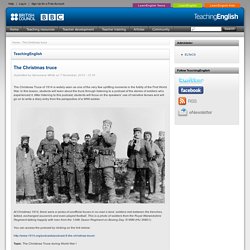
In this lesson, students will learn about the truce through listening to a podcast of the stories of soldiers who experienced it. After listening to this podcast, students will focus on the speakers’ use of narrative tenses and will go on to write a diary entry from the perspective of a WWI soldier. At Christmas 1914, there were a series of unofficial truces in no-man’s land. soldiers met between the trenches, talked, exchanged souvenirs and even played football.
Nobelprisvinner Kailash Satyarthis foredrag i fulltekst - NRK - Nobels fredspris. As it happened — Kailash Satyarthi, Malala Yousafzai receive Nobel Peace Prize. So we must work ... and not wait.
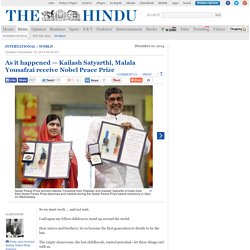
I call upon my fellow children to stand up around the world. Dear sisters and brothers, let us become the first generation to decide to be the last. The empty classrooms, the lost childhoods, wasted potential—let these things end with us. Let this be the last time that a boy or a girl spends their childhood in a factory. Let this be the last time that a girl gets forced into early child marriage. Malala Yousafzai - Facts. Kailash Satyarthi - Facts. Facts on the Nobel Peace Prizes. The three most common searches on individuals in the Nobel Peace Prize nomination database are Adolf Hitler, Mahatma Gandhi and Joseph Stalin.
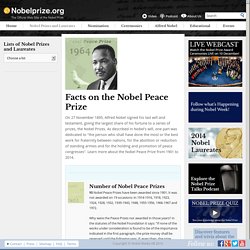
Joseph Stalin, the Secretary General of the Communist Party of the Soviet Union (1922-1953), was nominated for the Nobel Peace Prize in 1945 and 1948 for his efforts to end World War II. Mahatma Gandhi, one of the strongest symbols of non-violence in the 20th century, was nominated in 1937, 1938, 1939, 1947 and, finally, shortly before he was assassinated in January 1948. Although Gandhi was not awarded the Prize (a posthumous award is not allowed by the statutes), the Norwegian Nobel Committee decided to make no award that year on the grounds that "there was no suitable living candidate".
Read more about "the missing Laureate" The Nobel Peace Prize 2014. Watch Malala Yousafzai's Nobel Speech - Business Insider. Malala Nobel Peace Prize Acceptance Speech - Business Insider. ScreenshotMalala Yousafzai accepting her Nobel Peace Prize in Oslo, Norway.

Malala Yousafzai, a 17-year-old Pakistani girl, gave an incredible speech as she accepted her Nobel Peace Prize in Oslo, Norway on Wednesday after becoming an icon of the fight for children's education rights. She just became the youngest Nobel Peace Prize laureate in history, and her speech shows her spectacular wisdom. From a young age, Yousafzai made a name for herself in her community as someone who was unafraid to criticize the Taliban. She has been especially critical of terrorist attempts to prevent young girls from getting an education in Pakistan and elsewhere. During her Nobel speech, she commented on her attempted assassination at the hands of a Taliban gunman in 2012. "I had two options — one was to remain silent and wait to be killed," Yousafzai said. Profile: Malala Yousafzai. Image copyright Reuters Pakistani schoolgirl Malala Yousafzai wrote an anonymous diary about life under Taliban rule in north-west Pakistan.
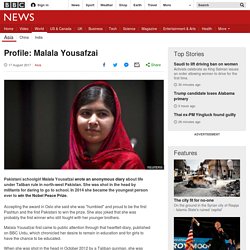
She was shot in the head by militants for daring to go to school. In 2014 she became the youngest person ever to win the Nobel Peace Prize. Accepting the award in Oslo she said she was "humbled" and proud to be the first Pashtun and the first Pakistani to win the prize. She also joked that she was probably the first winner who still fought with her younger brothers. Malala Yousafzai first came to public attention through that heartfelt diary, published on BBC Urdu, which chronicled her desire to remain in education and for girls to have the chance to be educated. Amnesty International USA. Individuals at Risk. Write for Rights 2014. Erkin Musaev. In 2006, former Ministry of Defence official Erkin Musaev was boarding a flight from his Uzbekistan to Kyrgyzstan, where he was due to attend a conference.
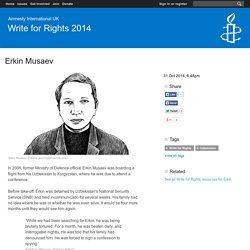
Before take-off, Erkin was detained by Uzbekistan's National Security Service (SNB) and held incommunicado for several weeks. His family had no idea where he was or whether he was even alive. It would be four more months until they would see him again. ‘While we had been searching for Erkin, he was being brutally tortured. For a month, he was beaten daily, and interrogated nightly. Physical and psychological torture Charged with spying, Erkin was reportedly subjected to a month of daytime beatings, night-time interrogations and threats to harm his family. Erkin has spent the last nine years in prison in north-western Uzbekistan. Erkin’s 81-year-old father Aidzhan Musaev has spent the last nine years campaigning for his son’s release. ‘By someone’s design, nine precious years of my son’s life have been stolen. Amnesty International USA. Write for Rights 2013 "Thank You!" Write.amnestyusa.org/assets/pdf/2014WriteForRightsCaseSheets.pdf.
2014WriteForRightsSampleLetters.pdf. Fem saker du inte visste om läget i världen. 30 oktober 2014av Världskoll Flera undersökningar visar att de flesta tror att läget i världen är mycket sämre än det faktiskt är.

Här är fem saker som du antagligen inte visste om världens utveckling. 1. Fler barn än någonsin börjar skolan! Idag börjar 9 av 10 barn i världen i skolan – det är fler än någonsin! Kvinnors liv. Amnesty International USA.